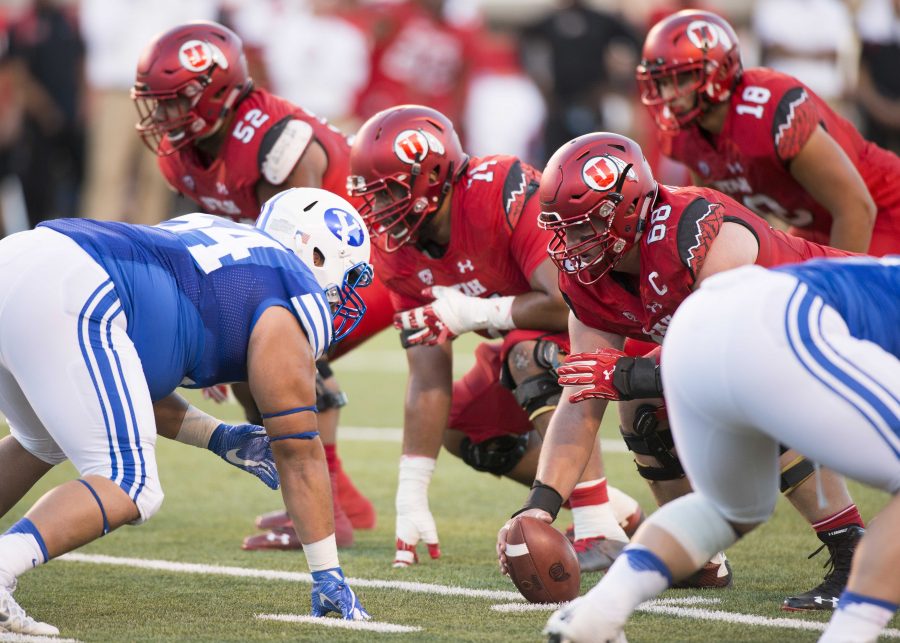Since the foundation of both the University of Utah and Brigham Young University, the rivalry and subsequent beef between the two establishments etched itself into the history books as one of the hottest and ongoing rivalries that exists in sports, including professional leagues. This, let’s call it “discontent,” will forever ensure that the history of one university involves the other. It will never be possible to talk about the U, especially in athletic terms, and not mention the school down south.
To prepare our readers for 2018’s iteration of the Holy War, here are some stats for the all-time matchup between the two football teams.
Quick Stats
-The first meeting between the two teams occurred on Apr. 6, 1896. The game was played at a neutral location in Salt Lake City, and Utah won the game, 12-4. BYU, at the time, was named Brigham Young Academy. The two teams would play two more times that year, splitting victories between the schools.
-From 1898 to 1941 (excluding two ties), Utah won every matchup between the schools. The Utes outscored the Cougars 530-64 in those games. BYU does not recognize the games played before 1922, when they were Brigham Young Academy.
-The first time BYU won consecutive games against the Utes was in 1965, when BYU defeated Utah 25-20 in Provo, and then followed up with a 35-13 victory in Salt Lake City the next year. This broke a 20-game win streak by the Utes against the Cougars.
-The most points scored by BYU against Utah is 70, when they beat the Utes 70-31 in 1989. The Utes’ highest tally against the Cougars is 57, which they achieved the year prior.
-Utah’s longest win streak, including ties, is 21, which occurred between 1898 and 1941. BYU’s longest streak came between 1979 and 1987, where the Cougars rattled off nine straight victories over the Utes.
-The two teams have only met in one bowl game, when in 2015, the Utes held onto 35 first-half points to secure a win in the Las Vegas Bowl, held at Sam Boyd Stadium.
-Legendary BYU head coach Lavell Edwards, whom their stadium is named after, ended his tenure with the Cougars after a last-second win over the Utes in Salt Lake City in 2000.
-The moniker of “Team Down South,” or “TDS” was coined by Utah head coach Urban Meyer in his first year with the team when he forbade the usage of “BYU” around the football facilities. The move was intended to imitate the rivalry between the Ohio State University and the University of Michigan, where Ohio State players referred to the Wolverines as “that team up North.”
-In 2003, Utah shut out BYU in what became known as the “Snow Bowl.” The shutout ended a 361-game scoring streak for the Cougars, which dated back to 1972.
-In 2004, Utah finished an undefeated campaign with a statement win over BYU, winning 52-21. Utah quarterback Alex Smith vented his “hatred” for the Cougars in the game’s following press conference.
-Utah has won the past seven matchups between the two schools. Utah was ranked in two of those matches, while BYU was not. Last year’s 19-13 win in Provo brought the all-time record to 60-34-4 in favor of the Utes.
-The matchup this week is the 99th all-time between the two schools. The teams will reconvene next year for the 100th.
-The two current head coaches, Kyle Whittingham and Kalani Sitake, have met two times since Sitake took over in Provo. Whittingham is 2-0 in those games. Sitake also came from the U, where he was an assistant coach to Whittingham from 2005-2014.
-Kyle Whittingham sits at a 154-104 all-time coaching record, while Kalani Sitake is 18-18 in his time at BYU. Whittingham is 9-3 against BYU in his 14 years with the Utes.
The rivalry between the two teams has only intensified as both programs have experienced national championship-level play, and extreme lows across the past century. While both teams are on a fairly level playing field this year, the animosity has definitely taken a downturn from the outright violence of years past. As the two teams continue to clash, the rivalry between the storied universities will only grow and intensify, but hopefully that intensity can stay on the field.


